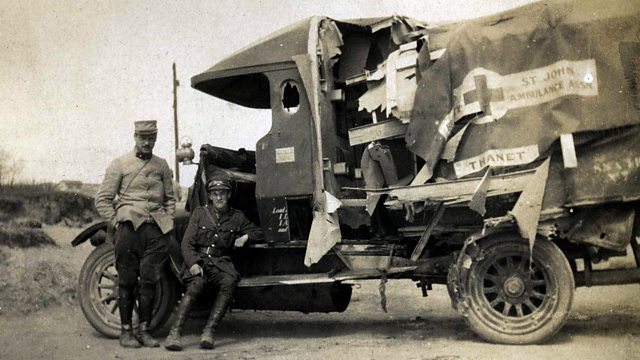Wellington, Somerset: The Outcast Ambulance Driver
A remarkable story of belief, prejudice and social ostracism
In 1988 an elderly man agreed to be interviewed about his experiences during World War One. In itself, an event that wasn’t unusual or remarkable. Lloyd Fox was 95-years-old and his memories were to be recorded by Lyn Smith who was gathering first-hand accounts of the period for the Imperial War Museum (IWM).
They sat down beside an open fire and as they spoke, Mr Fox occasionally rattled a box of matches as he paused to carefully consider his answers.
From the 1960s onwards there had been a trend among academics, research institutions and the media to gather recollections of the 1914-1918 conflict from the people who witnessed it. The reason was obvious and Mr Fox was merely the latest in a very long line of elderly men and women to sit in front of a microphone before they succumbed to old age and the inevitable. But what Lyn Smith couldn’t possibly have known beforehand was just what a powerful story of belief, prejudice and social ostracism she was about to record for posterity.
Although only 20-years-old when war broke out, Lloyd Fox was a well-known figure in Wellington. His family had a long history in sheep herding and textiles but moved into banking as a side line in the late 18th Century, creating Fox, Fowler & Co. The bank’s headquarters were in Wellington and it had fifty branches and agencies throughout Somerset, Devon and Cornwall.
Lloyd’s father was the chair of the partners and the firm is best remembered as the last English country bank to issue its own notes. This was a common practice in the Victorian era but gradually private bank notes dwindled as a ban on the practice was imposed on newly created institutions and mergers.
The last Fox, Fowler & Co. notes were released in 1921 just before the company became part of Lloyds Bank. One of the last £5 notes to be issued in Wellington is held by the British Museum. The final one to be issued was signed and framed and it hung on the wall in front of Lloyd Fox as he gave his interview to the IWM.
As a Quaker, Fox was a self-declared pacifist and conscientious objector. But he nevertheless wanted to do something to help in a humanitarian capacity. After unsuccessfully offering his services, and the use of his Douglas motorcycle, to ferry messages on the Western Front he volunteered for the Friends Ambulance Unit (FAU).
As early as 21 August 1914, an appeal went out for volunteers to join a Quaker run ambulance service to help save lives and provide a valuable contribution to those who objected to fighting on religious and moral grounds. He spent time as an administrator in the FAU offices then went on to drive ambulances at the Front in 1917 and 1918, even attending to casualties under fire. At one point he was recommended for the Military Medal; an honour which was never actually bestowed.
But Fox’s decision to work with the FAU was met with hostility and suspicion in Wellington to the extent that, despite being granted exemption from service by the War Office, he was summoned before the local Military Tribunal: “Local people in Wellington wanted to hear my views, so to speak, and no doubt tell me what a poor type I was, by that time, to be holding the view that I didn’t want to kill anybody.”
It was common for conscientious objectors to be treated as unpatriotic, especially once conscription was introduced in 1916. But Lloyd’s treatment by people he knew, in a small West Country market town, would have been particularly harsh.
“There were local people who wouldn’t speak to me, among them very prominently the vicar of Wellington, despite the fact that my father was his church warden, he wouldn’t speak to me.”
In his interview, Lloyd Fox went on to describe the how he felt that his objection to fighting resulted in him being a social outcast among some of his fellow townspeople. He hints strongly at the stress and concern it caused both him and later, his wife, who he described as being “a good Quaker…much more so than I [he] was.”
Location: Friends’ Meeting House, High Street, Wellington TA21 8RA
Image: FAU ambulance destroyed by shellfire. Photo courtesy of Religious Society of Friends (Quakers) in Britain
Duration:
This clip is from
Featured in...
![]()
���˿��� Somerset—World War One At ���˿���
Places in Somerset that tell a story of World War One
More clips from World War One At ���˿���
-
![]()
The loss of HMY Iolaire
Duration: 18:52
-
![]()
Scotland, Slamannan and the Argylls
Duration: 07:55
-
![]()
Scotland Museum of Edinburgh mourning dress
Duration: 06:17
-
![]()
Scotland Montrose 'GI Brides'
Duration: 06:41







